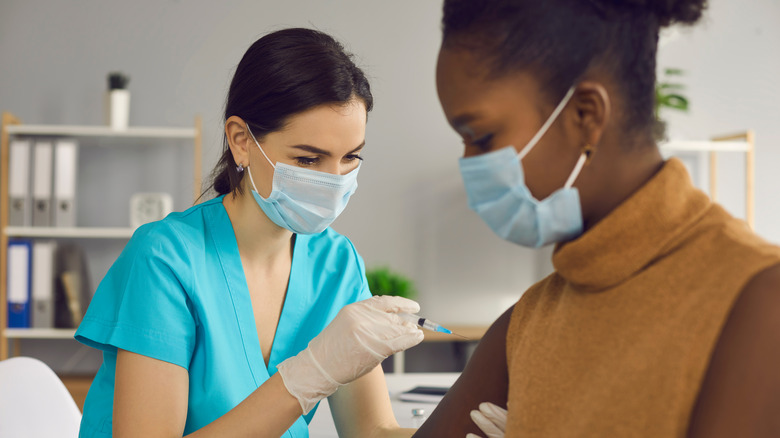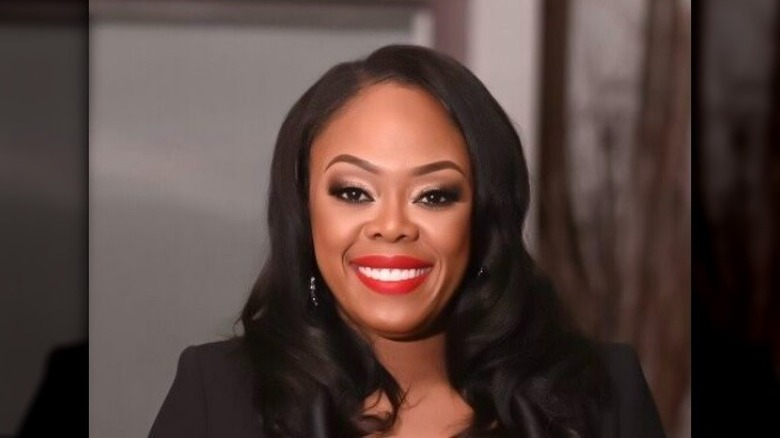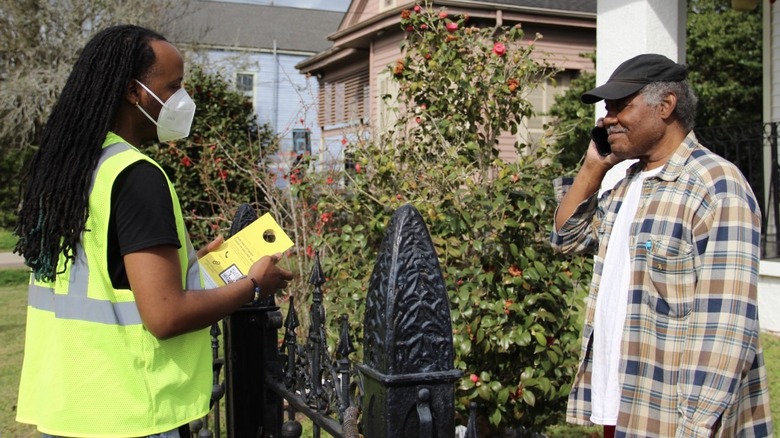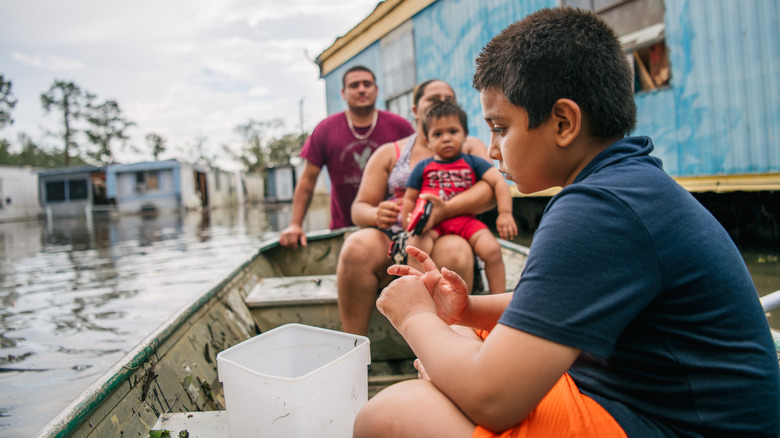New Orleans Resilience Corps Leader LaTanja Silvester On Inequity In COVID-19 Response — Exclusive Interview
When the World Health Organization declared COVID-19 a pandemic on March 11, 2020, the world was largely unprepared for what was to follow. By April 10, 2020, the U.S. had the highest number of COVID-19-related deaths in the world, with 23,036 Americans dying of COVID-19. Black, Latino, and Indigenous communities faced some of the worst health outcomes during the pandemic.
According to the U.S. Government Accountability Office (GAO), Hispanic/Latino and non-Hispanic Black people "were hospitalized with COVID-19 at a rate 2.8 times higher than non-Hispanic White people." Furthermore, the GAO also reported that Native American/Alaska Native people "died from COVID-19 at a rate 2.8 times higher than White people." The reasons behind these health disparities can be attributed to implicit bias in health care, socioeconomic factors, and lack of access to health care services.
One way to bridge the health disparity gap is to build community health worker programs, per The New England Journal of Medicine. Community health workers (CHWs) are residents who live in the regions they serve and use their shared experiences to connect with other community members and educate them on important public health issues. CHWs can also help deliver crucial supplies to neighborhoods that are most impacted by public health and natural disasters, which helps address the social determinants that cause health disparities among lower-income, BIPOC populations.
One group, called The New Orleans Resilience Corps, is sending CHWs to neighborhoods in New Orleans that were most affected by the pandemic. We spoke exclusively to LaTanja Silvester, leader of The New Orleans Resilience Corps, on the importance of addressing health and economic inequality during disaster responses.
The New Orleans Resilience Corps addresses health and economic disparities
In a nutshell, can you tell me what the main objectives of The New Orleans Resilience Corps are?
The New Orleans Resilience Corps is a culturally competent workforce development and jobs program launched in partnership between the City of New Orleans and Resilience Force, an organization working to strengthen disaster response and the resilience workforce. The project is the first of its kind in the nation and a lifeline for unemployed workers in New Orleans. Since its launch in October of 2020, The New Orleans Resilience Corps has strengthened the city's response to COVID-19 while creating economic opportunities for those who lost their jobs during the pandemic.
This bolstered crucial public health infrastructure by coordinating with contact tracers, conducting door-to-door canvassing and wellness checks, delivering food and other necessities, connecting residents with city and state services, and more. Our hope is that this model can be implemented in cities across the country to address the pandemic as well as other disasters, such as those related to climate change.
How does The New Orleans Resilience Corps work to specifically address issues surrounding racial and economic disparity?
The Corps works to address racial and health inequalities exacerbated by COVID-19 by targeting communities that have the greatest need for assistance and ensuring those who may not have the same access to education and information learn about COVID-19 and can take the appropriate precautionary measures. We also invest in the resilience workforce by providing stable jobs, creating and honoring working protections, and supporting infrastructure. Beyond the COVID-19 pandemic, we also led rehabilitation efforts, food distribution initiatives, and more following the hurricanes that hit New Orleans in August and served to further the gap of racial and economic disparity.
The Resilience Corps' success lies in its community health worker program
Public health professors in college often speak highly about the benefits of having a community health worker program. From a boots-on-the-ground perspective, how are community health workers able to bridge health disparity gaps in New Orleans?
Working closely with community advocates and leaning on the bonds between resilience workers and the people whose lives and communities they help rebuild is key to a successful recovery from any public health disaster. Our team of New Orleans Resilience Corps resilience workers is deeply connected to and immersed in affected communities. They have a profound and personal understanding of the residents and their needs, and can thus be more impactful in finding and implementing solutions rooted in equity and sustainability for the people of New Orleans. Additionally, community health worker programs create jobs, empower residents on both an individual and community-wide level, and bolster the local economy.
What are some of the challenges you have faced and currently face in implementing and executing this program?
Initially, I had to face the stark reality that Black and brown people's long and complicated history with both private and federal industries presented a difficult challenge. With that in mind, when I was developing the program model, I made it of extreme importance to foster equity in our outreach and engagement. I knew that to build trust and confidence in the BIPOC community, we needed to hire trusted community advocates who were culturally competent individuals from the communities we were engaging. I knew that this first step was crucial to our efforts to raise awareness about the benefits of vaccines and ensure an equitable recovery for people of color.
What are the most significant accomplishments that The New Orleans Resilience Corps has achieved in regard to the pandemic response?
Since the program's inception, we've spent over 1,200 hours in the field and reached over 15,000 residents, primarily in low-income and BIPOC communities. At the start of 2022, in collaboration with the New Orleans Health Department, Resilience Corps began engaging residents on their source of information for their most up-to-date COVID-19 information during the pandemic. We also collaborated and implemented a questionnaire that captures the base of information provided to residents and the source of information while emphasizing residents' ability to use the information rather than just understand it.
Resilience Corps community health workers are trained and prepared to enroll residents in the Supplemental Nutrition Assistance Program (SNAP). SNAP provides nutrition benefits to supplement the food budget of families in need so they may purchase healthy foods and move toward health sufficiency. This service also has a disaster program that serves residents who normally do not receive SNAP benefits. It provides eligibility to low-to-moderate-income households who do not normally receive SNAP benefits with help purchasing groceries due to loss of income or damages following a disaster like the pandemic.
Resilience Corps continues to focus on community engagement and connecting residents to resources throughout the city. Unite Us is a coordinated care network of health and social service providers. As a partner, we connect residents through Unite Us' shared technology platform, which enables our CHWs to send and receive electronic referrals, address residents' social needs, and improve their overall health.
Addressing health disparities at the height of the COVID-19 pandemic
With regard to the COVID-19 pandemic, what are some of the racial and economic disparities you've seen in New Orleans?
Communities of color have been disproportionately vulnerable to the devastating impacts of the COVID-19 pandemic. The pandemic hit the Black community hard, and research shows that Black people are three times more likely to contract COVID-19 than white residents. In Orleans Parish alone, Black populations have experienced 73% of COVID-19-related deaths, while accounting for just under 60% of the population.
According to the Louisiana Department of Health website, in Orleans Parish, the Black population makes up 56.17% of COVID-19 cases while the white population accounts for only 29.8% of cases. The percentage of cases relating to COVID-19 deaths among the Black population is 73.06% while the white population is 24.91%.
How accessible were the COVID-19 vaccines for Black, Latino, and lower-income populations in New Orleans?
Resilience Corps helped to increase COVID-19 testing and vaccination drives in underserved communities with a high population of people of color and strong vaccine hesitancy. Impressively, CHWs held 96 testing and vaccine drives and distributed over 13,000 COVID-19 home testing kits. The Latin community was one of the last to receive COVID-19 vaccines. The focus shifted to this population in late April of 2021. The Resilience Force community health workers assisted in translating the educational material and bringing vaccine sites directly to the Latin community.
When the vaccine came out, scientists were battling with misinformation on social media that led to some Americans being hesitant to get the COVID-19 vaccine. How were the community health workers able to educate and encourage New Orleans residents to vaccinate, despite the rampant misinformation?
Our outreach initiatives were designed to meet residents where they are and to provide the space and listening ear to hear people's concerns. To achieve this goal, Resilience Force implemented organizing techniques that employed community health workers to have courageous conversations. When the vaccine introduction was met with much hesitancy, our CHWs were trained to foster conversations to help meet hesitation with compassion, understanding, and valuable information about the vaccines. Our method of engagement focused on the 80/20 rule of active listening. This communication practice means listening 80% of the time and speaking 20%. The technique allowed residents to share their concerns and for CHWs to listen thoughtfully, which helped build a deep bond and trust with individuals.
The importance of prioritizing equity in disaster response
The New Orleans Resilience Corps has also done previous work in climate change disaster recovery. How exactly did this experience translate to COVID-19 public health outreach efforts?
The New Orleans Resilience Corps was born out of the success and learnings of Resilience Force, a national movement that began after Hurricane Katrina to work to transform America's response to disasters by strengthening and securing our national resilience workforce — the millions of people whose work, heart, and expertise make sustainable recovery from disasters possible. Resilience Force works to rewrite the rules of disaster recovery and ensure a more effective, equitable, and sustainable approach for all people affected by the rapidly increasing "new normal" of climate disasters.
At the onset of COVID-19, the New Orleans community was devastated by a different kind of disaster, but a disaster nonetheless, that required the same kind of organization, forward-thinking approach, and human-centric approach to rebuild. Just as Resilience Force did for climate disasters, The Corps honed in on the needs of the resilience workforce and their bonds with the community, particularly by connecting the unemployed workers who lost their jobs in the pandemic to year-round work in adaptation and resilience, and training them in community health outreach practices to perform critical functions to limit the spread of COVID-19. In doing so, we were able to address both the public health and the economic crisis.
The CDC has declared racism a public health emergency that is leading to disparities in health outcomes. Where do we as a community go from here?
The pandemic and the rapidly accelerating climate crisis have shown that BIPOC communities are disproportionately vulnerable to disasters and the public health impacts that come along with them. As a path forward, we need to transform disaster recovery so that it increases racial and economic equity and strengthens social bonds, rather than leaving these communities worse off.
For too long, the disaster recovery industry has prioritized property over people and directed funds to wealthy homeowners, only serving to make the rich richer and leave marginalized communities in economic despair. We need to rewrite the rules of recovery to bring together resilience workers, disaster-affected community members, and activists to rebuild and support the resilience workforce with the labor protections, health care benefits, job stability, and wages needed to do their jobs. This will require buy-in from the federal government to establish a formalized resilience workforce, as well as commitment from the private sector to protect workers and improve job quality.
Learn more about the Resilience Force and The New Orleans Resilience Corps on the Resilience Force website.





